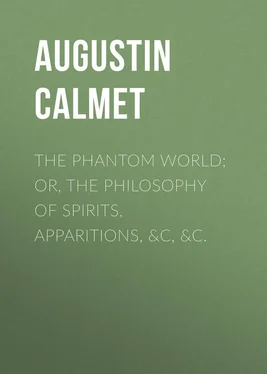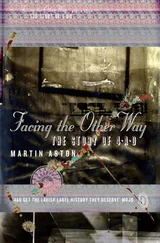Augustin Calmet - The Phantom World; or, The philosophy of spirits, apparitions, &c, &c.
Здесь есть возможность читать онлайн «Augustin Calmet - The Phantom World; or, The philosophy of spirits, apparitions, &c, &c.» — ознакомительный отрывок электронной книги совершенно бесплатно, а после прочтения отрывка купить полную версию. В некоторых случаях можно слушать аудио, скачать через торрент в формате fb2 и присутствует краткое содержание. Жанр: foreign_antique, foreign_prose, на английском языке. Описание произведения, (предисловие) а так же отзывы посетителей доступны на портале библиотеки ЛибКат.
- Название:The Phantom World; or, The philosophy of spirits, apparitions, &c, &c.
- Автор:
- Жанр:
- Год:неизвестен
- ISBN:нет данных
- Рейтинг книги:3 / 5. Голосов: 1
-
Избранное:Добавить в избранное
- Отзывы:
-
Ваша оценка:
- 60
- 1
- 2
- 3
- 4
- 5
The Phantom World; or, The philosophy of spirits, apparitions, &c, &c.: краткое содержание, описание и аннотация
Предлагаем к чтению аннотацию, описание, краткое содержание или предисловие (зависит от того, что написал сам автор книги «The Phantom World; or, The philosophy of spirits, apparitions, &c, &c.»). Если вы не нашли необходимую информацию о книге — напишите в комментариях, мы постараемся отыскать её.
The Phantom World; or, The philosophy of spirits, apparitions, &c, &c. — читать онлайн ознакомительный отрывок
Ниже представлен текст книги, разбитый по страницам. Система сохранения места последней прочитанной страницы, позволяет с удобством читать онлайн бесплатно книгу «The Phantom World; or, The philosophy of spirits, apparitions, &c, &c.», без необходимости каждый раз заново искать на чём Вы остановились. Поставьте закладку, и сможете в любой момент перейти на страницу, на которой закончили чтение.
Интервал:
Закладка:
But I think I can remark vestiges of oracles in Egypt, from the time of the patriarch Joseph, and from the time of Moses. The Hebrews had dwelt for 215 years in Egypt, and having multiplied there exceedingly, had begun to form a separate people and a sort of republic. They had imbibed a taste for the ceremonies, the superstitions, the customs, and the idolatry of the Egyptians.
Joseph was considered the cleverest diviner and the greatest expounder of dreams in Egypt. They believed that he derived his oracles from the inspection of the liquor which he poured into his cup. Moses, to cure the Hebrews of their leaning to the idolatry and superstitions of Egypt, prescribed to them laws and ceremonies which favored his design; the first, diametrically opposite to those of the Egyptians; the second, bearing some resemblance to theirs in appearance, but differing both in their aim and circumstances.
For instance, the Egyptians were accustomed to consult diviners, magicians, interpreters of dreams, and augurs; all which things are forbidden to the Hebrews by Moses, on pain of rigorous punishment; but in order that they might have no room to complain that their religion did not furnish them with the means of discovering future events and hidden things, God, with condescension worthy of reverential admiration, granted them the Urim and Thummim , or the Doctrine and the Truth, with which the high-priest was invested according to the ritual in the principal ceremonies of religion, and by means of which he rendered oracles, and discovered the will of the Most High. When the ark of the covenant and the tabernacle were constructed, the Lord, consulted by Moses, 186 186 Exod. xxv. 22.
gave out his replies from between the two cherubim which were placed upon the mercy-seat above the ark. All which seems to insinuate that, from the time of the patriarch Joseph, there had been oracles and diviners in Egypt, and that the Hebrews consulted them.
God promised his people to raise up a prophet 187 187 Deut. xviii. 13.
among them, who should declare to them his will: in fact, we see in almost all ages among them, prophets inspired by God; and the true prophets reproached them vehemently for their impiety, when instead of coming to the prophets of the Lord, they went to consult strange oracles, 188 188 2 Kings i. 2, 3, 16, &c.
and divinities equally powerless and unreal.
We have spoken before of the teraphim of Laban, of the idols or pretended oracles of Micah and Gideon. King Saul, who, apparently by the advice of Samuel, had exterminated diviners and magicians from the land of Israel, desired in the last war to consult the Lord, who would not reply to him. He then afterwards addressed himself to a witch, who promised him she would evoke Samuel for him. She did, or feigned to do so, for the thing offers many difficulties, into which we shall not enter here.
The same Saul having consulted the Lord on another occasion, to know whether he must pursue the Philistines whom he had just defeated, God refused also to reply to him, 189 189 1 Sam. xiv. 24.
because his son Jonathan had tasted some honey, not knowing that the king had forbidden his army to taste anything whatever before his enemies were entirely overthrown.
The silence of the Lord on certain occasions, and his refusal to answer sometimes when He was consulted, are an evident proof that He usually replied, and that they were certain of receiving instructions from Him, unless they raised an obstacle to it by some action which was displeasing to Him.
CHAPTER XVI.
THE CERTAINTY OF THE EVENT PREDICTED IS NOT ALWAYS A PROOF THAT THE PREDICTION COMES FROM GOD
Moses had foreseen that so untractable and superstitious a people as the Israelites would not rest satisfied with the reasonable, pious, and supernatural means which he had procured them for discovering future events, by giving them prophets and the oracle of the high-priest. He knew that there would arise among them false prophets and seducers, who would endeavor by their illusions and magical secrets to mislead them into error; whence it was that he said to them: 190 190 Deut. xiii. 1, 2.
"If there should arise among you a prophet, or any one who boasts of having had a dream, and he foretells a wonder, or anything which surpasses the ordinary power of man, and what he predicts shall happen; and after that he shall say unto you, Come, let us go and serve the strange gods, which you have not known; you shall not hearken unto him, because the Lord your God will prove you, to see whether you love Him with all your heart and with all your soul."
Certainly, nothing is more likely to mislead us than to see what has been foretold by any one come to pass.
"Show the things that are to come," says Isaiah, 191 191 Isaiah xli. 22, 23.
"that we may know that ye are gods. Let them come, let them foretell what is to happen, and what has been done of old, and we will believe in them," &c. Idoneum testimonium divinationis , says Turtullian, 192 192 Tertull. Apolog. c. 20.
veritas divinationis . And St. Jerome, 193 193 Hieronym. in Dan.
Confitentur magi, confitentur arioli, et omnis scientia sæcularis litteraturæ, præescientiam futurorum non esse hominum, sed Dei .
Nevertheless, we have just seen that Moses acknowledges that false prophets can predict things which will happen. And the Saviour warns us in the Gospel that at the end of the world several false prophets will arise, who will seduce many 194 194 Matt. xxiv. 11, 24.
– "They shall shew great signs and wonders, insomuch that, if it were possible, they shall deceive even the elect." It is not, then, precisely either the successful issue of the event which decides in favor of the false prophet – nor the default of the predictions made by true prophets which proves that they are not sent by God.
Jonah was sent to foretell the destruction of Nineveh, 195 195 Jonah i. 2.
which did not come to pass; and many other threats of the prophets were not put into execution, because God, moved by the repentanceof the sinful, revoked or commuted his former sentence. The repentance of the Ninevites guarantied them against the last misfortune.
Isaiah had distinctly foretold to King Hezekiah 196 196 2 Kings xx. 1. Isai. xxxviii. 1.
that he would not recover from his illness: "Set thine house in order, for thou shalt die, and not live." Nevertheless, God, moved with the prayer of this prince, revoked the sentence of death; and before the prophet had left the court of the king's house, God commanded him to return and tell the king that God would add yet fifteen years to his life.
Moses assigns the mark of a true prophet to be, when he leads us to God and his worship – and the mark of a false prophet is, when he withdraws us from the Lord, and inclines us to superstition and idolatry. Balaam was a true prophet, inspired by God, who foretold things which were followed up by the event; but his morals were very corrupt, and he was extremely self-interested. He did everything he could to deserve the recompense promised him by the king of Moab, and to curse and immolate Israel. 197 197 Numb. xxii. xxiii. xxiv.
God did not permit him to do so; he put into his mouth blessings instead of curses; he did not induce the Israelites to forsake the Lord; but he advised the Moabites to seduce the people of God, and cause them to commit fornication, and to worship the idols of the country, and by that means to irritate God against them, and draw upon them the effects of his vengeance. Moses caused the chiefs among the people, who had consented to this crime, to be hung; and caused to perish the Midianites who had led the Hebrews into it. And lastly, Balaam, who was the first cause of this evil, was also punished with death. 198 198 Numb. xxxi. 8.
Интервал:
Закладка:
Похожие книги на «The Phantom World; or, The philosophy of spirits, apparitions, &c, &c.»
Представляем Вашему вниманию похожие книги на «The Phantom World; or, The philosophy of spirits, apparitions, &c, &c.» списком для выбора. Мы отобрали схожую по названию и смыслу литературу в надежде предоставить читателям больше вариантов отыскать новые, интересные, ещё непрочитанные произведения.
Обсуждение, отзывы о книге «The Phantom World; or, The philosophy of spirits, apparitions, &c, &c.» и просто собственные мнения читателей. Оставьте ваши комментарии, напишите, что Вы думаете о произведении, его смысле или главных героях. Укажите что конкретно понравилось, а что нет, и почему Вы так считаете.












